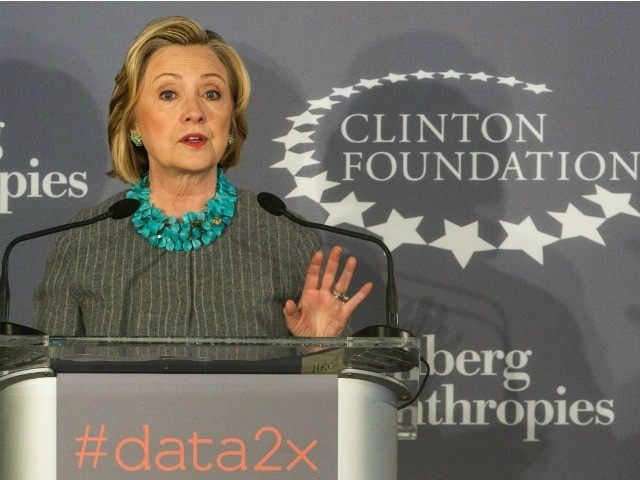Clinton Foundation mega donor Frank Holmes was grilled on Tuesday in a blistering CNBC interview when Holmes gave answers at odds with CNBC’s own reporting about his investments in the highly controversial Uranium One—a company Hillary Clinton’s State Dept. approved for a 2010 sale to the Russian government that resulted in the transfer of 20 percent of all U.S. uranium to the Russian government, according to the New York Times and Clinton Cash.
Nine Uranium One investors, including Frank Holmes, gave Hillary’s foundation a combined $145 million.
In a CNBC Squawk Box segment titled “The Clinton Cash Scandal: Frank Holmes,” U.S. Global Investors CEO Frank Holmes was asked when he invested and sold Uranium One. The exchange produced an embarrassing moment for Holmes, as his on-air statements directly contradicted the CNBC fact graphics displayed on the screen.
In a graphics box titled “From the New York Times,” the CNBC screen graphic stated: “Frank Holmes donated between $250-$500k to the Clinton Foundation—U.S. Global Investors held $4.7 million in Uranium Ones shares in Q1 of 2011.”
U.S. Global Investors’ own 2011 SEC filing further confirms Holmes’ company held Uranium One.
However, when CNBC host Joe Kernan asked Holmes when he bought and sold the uranium stock, Holmes’s answer contradicted CNBC’s fact box.
“We were long gone before 2008,” claimed Holmes.
“You didn’t own it when it was acquired by the Russians [2010]?” asked Kernan.
“Uh, by the, by what the date is. I bought it early and I sold it before 2008,” said Holmes, before adding that he gives money to orphanages.
“You sold the stock in 2008?” asked Kernan.
“We were long gone well before all that,” said Holmes.
CNBC’s chief international correspondent Michelle Caruso-Cabrera then jumped in to follow-up on Kernan’s line of questioning.
“But the suggestion is that you donated money to a foundation that was connected with the possibility of approval of a deal that you may have benefited from. Is that correct?” Caruso-Cabrera asked Holmes.
“No, that’s a lot of disinformation. That’s just a political battle this year,” said Holmes.
“But, still, the question is, were you in a position to benefit from approval of this deal at the same time that you were writing checks to the Clinton Foundation?” asked Caruso-Cabrera.
“No, there’s no, I had no idea any of those two events. There are two separate events,” said Holmes.
The CNBC hosts appeared stunned, before CNBC host Andrew Ross Sorkin jumped in.
“When people finish watching this interview, they’re going to say, it wasn’t unequivocal on your part and that there wasn’t a lot of clarity,” said Sorkin.
“I don’t understand. I have no idea what—you’re making—lots of conjecture,” Holmes fired back.
“We’ll give you one last shot at it,” said Sorkin. “In a sentence or two, unequivocally, anything you want to say? Because right now it’s all a big haze for us.”
“There’s no haze. I have a global investment company and I invest in many companies in many different countries and I give to a lot of charitable organizations,” said Holmes.
“Unfortunately, I don’t think it speaks to the answer. We’ll leave it there,” said Sorkin.
Hillary Clinton has yet to answer a single question surrounding the widening Clinton Cash scandals or her role in the transfer of 20% of U.S. uranium to the Russian government.

COMMENTS
Please let us know if you're having issues with commenting.